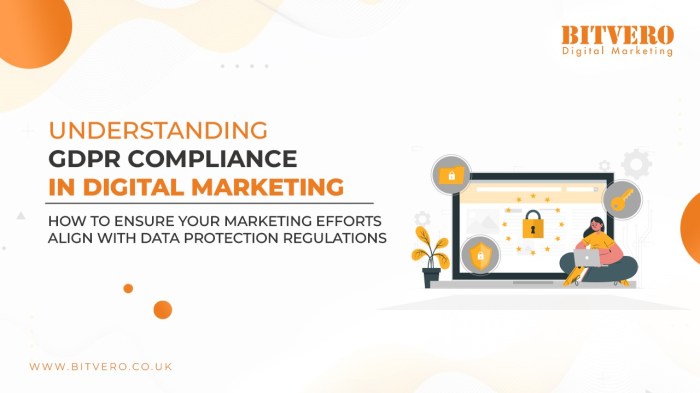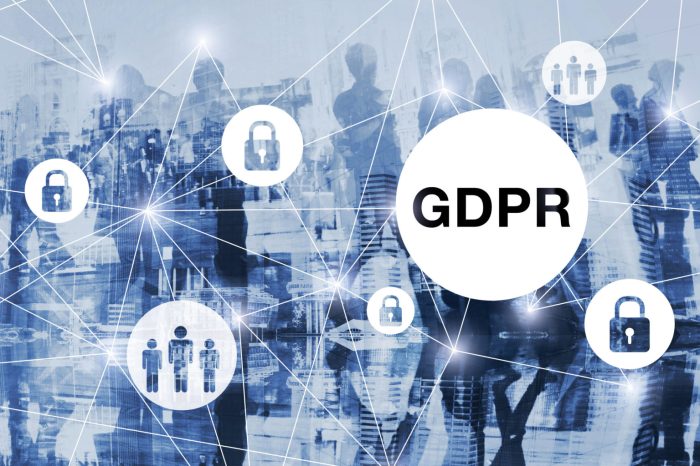Understanding GDPR Compliance, let’s dive into the world of data protection laws and regulations that impact businesses in the EU. From its core principles to compliance requirements, this topic is crucial for organizations to grasp in today’s digital landscape.
Overview of GDPR Compliance
GDPR, which stands for General Data Protection Regulation, is a comprehensive data protection law that aims to give individuals greater control over their personal data and how it is used by organizations. It was adopted in April 2016 and became enforceable in May 2018, replacing the outdated Data Protection Directive.
One of the main objectives of GDPR is to harmonize data privacy laws across Europe and to protect the personal data of EU citizens. It sets strict guidelines on how organizations should collect, process, and store personal data, as well as how they should respond to data breaches.
GDPR compliance is crucial for businesses operating in the EU because failure to comply can result in hefty fines of up to 4% of the company’s global annual turnover or €20 million, whichever is higher. It also helps build trust with customers by showing a commitment to protecting their data and privacy.
Key Principles of GDPR: Understanding GDPR Compliance
In order to understand GDPR compliance, it is essential to grasp the key principles that govern this regulation. These principles serve as the foundation for how organizations handle personal data and ensure the protection of individuals’ privacy rights.
Lawfulness, Fairness, and Transparency
- Organizations must process personal data in a lawful, fair, and transparent manner.
- This means that data processing activities must have a legitimate basis, be conducted fairly, and individuals must be informed about how their data is being used.
Purpose Limitation and Data Minimization, Understanding GDPR Compliance
- Under GDPR, organizations are required to collect and process personal data for specified, explicit, and legitimate purposes.
- Data minimization involves restricting the collection of personal data to only what is necessary for the intended purpose.
- Minimizing data helps reduce the risks associated with data breaches and unauthorized access.
Accountability Principle
- The accountability principle requires organizations to demonstrate compliance with GDPR by implementing appropriate measures and safeguards to protect personal data.
- Organizations must maintain records of their data processing activities and be able to demonstrate compliance upon request.
- Failure to adhere to the accountability principle can result in fines and penalties imposed by regulatory authorities.
Personal Data and GDPR
Personal data under GDPR refers to any information that can directly or indirectly identify a specific individual. This includes names, addresses, identification numbers, biometric data, and more. It’s crucial to understand what constitutes personal data to ensure compliance with GDPR regulations.
Rights of Individuals Regarding Their Personal Data
- Right to access: Individuals have the right to request access to their personal data and information about how it is being processed.
- Right to rectification: Individuals can request that inaccurate or incomplete data be corrected.
- Right to erasure: Also known as the “right to be forgotten,” individuals can request the deletion of their personal data under certain circumstances.
- Right to restriction of processing: Individuals can request the limitation of how their data is processed.
- Right to data portability: Individuals can request their personal data in a commonly used, machine-readable format for transfer to another controller.
- Right to object: Individuals can object to the processing of their personal data, including for direct marketing purposes.
Lawful Basis for Processing Personal Data under GDPR
Processing of personal data is only lawful if it is done under one of six lawful bases Artikeld in the GDPR:
- Consent: The individual has given clear consent for their data to be processed for a specific purpose.
- Contract: Processing is necessary for the performance of a contract with the individual.
- Legal obligation: Processing is necessary to comply with a legal obligation.
- Vital interests: Processing is necessary to protect someone’s life.
- Public task: Processing is necessary to perform a task in the public interest or for official functions.
- Legitimate interests: Processing is necessary for the legitimate interests pursued by the data controller or a third party, except where overridden by the interests, rights, and freedoms of the data subject.
GDPR Compliance Requirements

To achieve GDPR compliance, businesses need to take several key steps to ensure the protection of personal data and adhere to the regulations set forth by the General Data Protection Regulation (GDPR). This involves implementing robust data protection measures, appointing data protection officers, and conducting regular assessments to identify and mitigate risks.
Role of Data Protection Officers
Data protection officers play a crucial role in ensuring GDPR compliance within an organization. They are responsible for overseeing data protection strategies, monitoring compliance with the GDPR, and acting as a point of contact for data subjects and supervisory authorities. Data protection officers help to educate staff on GDPR requirements, conduct audits, and ensure that data processing activities are carried out in accordance with the regulations.
Importance of Data Protection Impact Assessments
Data protection impact assessments are essential for organizations to assess the potential risks associated with data processing activities and identify measures to mitigate those risks. By conducting these assessments, businesses can proactively identify and address privacy risks, ensuring that personal data is processed in a compliant and secure manner. This helps to build trust with customers and demonstrates a commitment to data protection and privacy.
Penalties for Non-Compliance

In the world of GDPR, failing to comply with the regulations can lead to some serious consequences. Organizations that do not adhere to the rules risk facing hefty fines and penalties that can have a significant impact on their reputation and financial stability.
Potential Fines and Penalties
Organizations that violate GDPR can face fines of up to €20 million or 4% of their annual global turnover, whichever is higher. These fines are not to be taken lightly and can severely impact a company’s bottom line.
Real-World Examples of Penalties
One notable case of GDPR violation was when British Airways was fined £20 million for a data breach that exposed the personal information of over 400,000 customers. Another example is Google, which was fined €50 million for lack of transparency and inadequate consent mechanisms for personalized ads.
Reputational and Financial Risks
Non-compliance with GDPR not only results in financial penalties but also poses a significant reputational risk. Customers may lose trust in an organization that fails to protect their data, leading to a loss of business and damage to the company’s brand image.